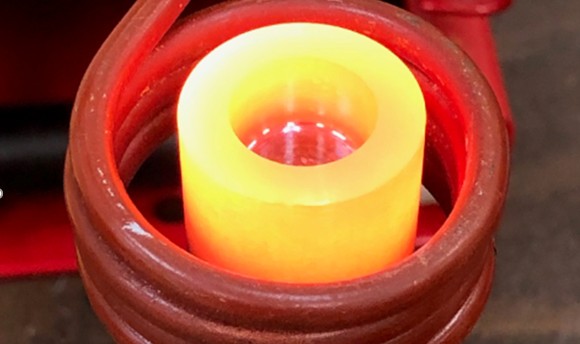Curing Material on an Aluminum Mandrel
Objective Heat a customer supplied aluminum cylinder to 80-120°C for a material curing application. More application notes
Processes
Processes: More
Processes: More

Industries:
Industries: More
Industries: More
Industries: More

Products:
Products: More
Services:
Services: More

Learn:
Learn: More
About:

1 min read
Brett Daly
5/22/19 3:32 PM

A client from the aerospace industry came to THE LAB at Ambrell looking to upgrade their current induction system. The application involved brazing a steel assembly. They liked induction's speed and repeatability, but wanted to take advantage of the latest induction technology. Consequently, they turned to THE LAB to prove out their process on a modern Ambrell induction heating system.
THE LAB's application team determined that an Ambrell EASYHEATTM 2.4 kW, 150-400 kHz induction heating power supply would meet the client's objectives. A custom-designed multiple-turn helical coil was built to generate the required heating for the application. Temperature indicating paint was then applied to the part, which dissolves when the part reaches temperature. It took about 50 seconds to heat the part to temperature, which met the client's objectives.
Induction offers several benefits when compared to alternative heating methods such as torch brazing. Speed is of course a significant benefit. Repeatability is another common reason companies switch to induction. With induction, you can expect the same result time after time. Finally, induction provides work environment and safety advantages since no open flame is introduced into the work place like there is with a torch.
If you have an application you'd like assessed, contact THE LAB to take advantage of complimentary induction heating application testing from our expert team. 

Objective Heat a customer supplied aluminum cylinder to 80-120°C for a material curing application. More application notes

In today’s manufacturing landscape, efficiency, precision, and sustainability are critical. Induction heating—a process that uses electromagnetic...

When it comes to many manufacturing processes, including this forging application, precision and efficiency are critical. Traditional heating methods...